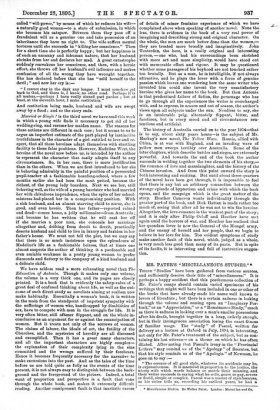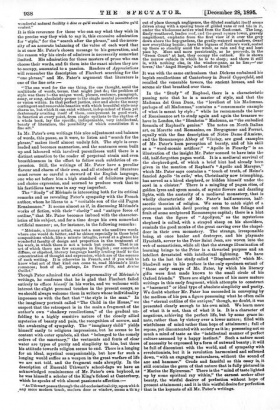MR. PATER'S "MISCELLANEOUS STUDIES."*
THESE " Studies " have been gathered from various sources, and sufficiently deserve their title of "miscellaneous." It is perhaps a happy accident that this posthumous collection of Mr. Pater's essays should contain varied specimens of his
writings that might well have been included in one or other of the books that have already made his name well known to lovers of literature ; but there is a certain sadness in looking through the volume and coming upon an "Imaginary Por- trait," or an "Appreciation," or a "Renaissance Study," much as there is sadness in looking over a man's smaller possessions after his death, brought together in a heap, orderly enough, but in their incongruous association losing the exact fitness of familiar usage. The " study " of Pascal, written for delivery as a lecture at Oxford in July, 1894, is interesting, not only for Mr. Pater's treatment of the subject, but as con- taining his last utterance on a theme on which he has often dilated. After noting that Pascal's irony in the 'Provincial Letters" may remind us of the " Apology " of Socrates, but that his style reminds us of the " Apologia " of Newman, he goes on to say :—
" The essence of all good style, whatever its accidents may be, is expressiveness. It is mastered in proportion to the justice, the nicety with which words balance or match their meaning, and their writer succeeds in saying what he wills, grave or gay, severe or florid, simple or complex. Pascal was a master of style because, as his sister tells us, recording his earliest years, he had a • miseevaneous Studies. By Walter Peer. Loudon : Idaemi'lan and Oa. wonderful natural facility d dire cc qts'il voulait en /a manilre qu'il vouiatt."
It is this reverence for those who can say what they wish in the precise way they wish to say it, this excessive admiration for "style," for the "search after the phrase," and the neces- sity of an accurate balancing of the value of each word that
is at once Mr. Pater's chosen message to his generation, and the reason why his circle of admirers is necessarily somewhat limited. His admiration for those masters of prose who can choose their words, and fit them into the exact niches they are
to occupy, amounted to a passion. Readers of Appreciations will remember the description of Flaubert searching for the "one phrase," and Mr. Pater's argument that literature is
one of the fine arts :—
"The one word for the one thing, the one thought, amid the multitude of words, terms, that might just do; the problem of style was there !—the unique word, phrase, sentence, paragraph, essay, or song, absolutely proper to the single mental presentation or vision within. In that perfect justice, over and above the many contingent and removable beauties with which beautiful style may charm us, but which it can exist without, independent of them yet dexterously availing itself of them, omnipresent in good work, in function at every point, from single epithets to the rhythm of a whole boa, lay the specific, indispensable, very intellectual, beauty of literature, the possibility of which constitutes it a fine art."
In Mr. Pater's own writings this nice adjustment and balance of words, this pause, as it were, to listen and "search for the
phrase," makes itself almost unduly felt. The style is over- loaded and becomes mannerism, and the sentences seem built up and laboured with involved parentheses until there is a distinct sensation to the reader of perpetual strain and even breathlessness in the effort to follow such subtleties of ex- pression. Still, the writings of Mr. Pater have a peculiar flavour and charm of their own, and all students of literature must revere so careful a steward of the English language, one who set before him a high standard of felicitous phrase and choice expression, and scorned to produce work that to
his fastidious taste was in any way imperfect.
The " Study " of Merimee is interesting both for its critical remarks and as revealing Pater's sympathy with the French author, whom he likens to a "veritable son of the old Pagan Renaissance." It seems almost as if, in discussing Merimee's works of fiction, with their " clarity " and "antique force of outline," that Mr. Pater becomes imbued with the character- istics of his subject, and for a time drops his own somewhat artificial manner ; as, for instance, in the following remarks :
"Merimee, a literary artist, was not a man who used two words where one would do better, and he shines especially in those brief compositions which, like a minute intaglio, reveal at a glance his wonderful faculty of design and proportion in the treatment of his work, in which there is not a touch but counts. That is an art of which there are few examples in English ; our somewhat diffuse, or slipshod, literary language hardly lending itself to the concentration of thought and expression, which are of the essence of such writing. It is otherwise in French, and if you wish to know what art of that kind can come to, read Merimee's little romances ; best of all, perhaps, La Venus and Ars(sne Guillot."
Though Pater admired the strict impersonality of Merimee's writings, he confesses that he is glad that Flaubert failed entirely to efface himself in his works, and we welcome with interest the slight personal touches in the present essays, as
we should always welcome them in writers whose individuality impresses us with the fact that "the style is the man." In the imaginary portrait called "The Child in the House," we suspect that the retrospect is in the main a fragment of the author's own "shadowy recollections," of the gradual un- folding to a highly sensitive nature of the closely allied mysteries of beauty and pain, the recognition of sorrow, and the awakening of sympathy. The "imaginary child" yields himself easily to religious impressions, but he seems to be content with outer symbols, all that "belonged to the comely orders of the sanctuary," the vestments and fonts of clear water are types of purity and simplicity to him, but there his attitude towards religion seems to end. There is a longing for an ideal, mystical companionship, but how far such a longing would suffice as a weapon in the great warfare of life we are not told, and the fragment ends abruptly. In the description of Emerald Uthwart's school-days we have an acknowledged reminiscence of Mr. Pater's own boyhood, as he was himself a scholar of the King's School at Canterbury, which he speaks of with almost passionate affection:—
" As Uthwart passes through the old ecclesiastical city,upon which any =me modern touch, modern door or window, seems a thns out of place through negligence, the diluted sunlight itself seems driven along with a sparing trace of gilded vane or red tile in it, under the wholesome active wind from the East coast. The long, finely.weathered, leaden roof, and the great square tower, gravely magnificent, emphatic from the first view of it over the grey down above the hop-gardens, the gently-watered meadows, dwarf now everything beside ; have the bigness of Nature's work, seated up there so steadily amid the winds, as rain and fog and heat pass by. More and more persistently, as he proceeds, in the Green Court' at last, they occupy the outlook. He is shown the narrow cubicle in which he is to sleep ; and there it still
is, with nothing else, in the window-pane, as he lies our tower,' the 'Angel Steeple,' noblest of its kind."
It was with the same enthusiasm that Dickens embalmed his boyish recollections of Canterbury in David Copperfield, and
recalled the venerable towers, the ancient houses, and the serene air that breathed over them.
In the "Study" of Raphael, there is a characteristic passing note that he is a master of style, and that the Madonna del Gran Duca, the "loveliest of his Madonnas,
perhaps of all Madonnas," contains a "consummate example of what is meant by style ; " while he recommends the lover of Renaissance art to study again and again the treasure we have in London, the " Blenheim " Madonna, as "the embodied
formula of Raphael's genius." The notes on North Italian art, on Moretto and Romanino, on Borgognone and Ferrari, equally with the fine description of Notre Dame d'Amiens, and the Romanesque Abbey of Vezelay, are good examples of Mr. Pater's keen perception of beauty, and of his skill as a "word-mosaic artificer." "Apollo in Picardy" is an illustration of the insight Mr. Pater seemed to have into the old, hall-forgotten pagan world. It is a mediaeval survival of the shepherd-god, of which a brief hint had already been given in the mention of Raphs,el's "Apollo and Marsyas," which Mr. Pater says contains a "touch of truth, of Heine's fancied Apollo 'in exile,' who, Christianity now triumphing, has served as a hired shepherd, or bidden himself under the cowl in a cloister." There is a mingling of pagan rites, of golden lyres and syren music, of mystic flowers and dazzling lights, with the austerity of a media3val monastery, that is wholly characteristic of Mr. Pater's half-sensuous, half- ascetic theories of religion. We seem to catch sight of a grotesque monkish devil peering out from the foliage and fruit of some sculptured Romanesque capital; there is a hint even that the figure of " Apollyon," as the mysterious shepherd is called, with a strayed sheep on his shoulders,
reminds the good monks of the great carving over the chapel- door in their own monastery. The strange, irresponsible being, at once healer and destroyer, and his playmate Hyacinth, server to the Prior Saint Jean, are woven into the web of monasticism, while all that the strange illumination of
learning brings to the Prior is a thwarted purpose and an
intellect devastated with intellectual lightning. We have left to the last the study called "Diaphaneite," which Mr.
Shadwell says in his preface is the only specimen extant of "those early essays of Mr. Pater, by which his literary gifts were first made known to the small circle of his Oxford friends." There are slight traces of his more mature writings in this early fragment, which attempts to construct a "basement" or ideal type of absolute simplicity and purity. We doubt whether Mr. Pater has succeeded in conveying by the medium of his pen a figure possessing what he often calls the "eternal outline of the antique," though, no doubt, it was presented clearly enough to his own mind. We learn more of what it is not, than of what it is. It is a character of negations, achieving the perfect life, but by some grace in- nate, rather than by victory over a lower nature; filled with wistfulness of mind rather than hope of attainment; full of repose, yet discontented with society as it is ; possessing not so much a mind of taste as the "intellectual manner of perfect culture assumed by a happy instinct." Such a nature must of necessity be expressed by a form of outward beauty ; it will be full of discontent with the world, and of sympathy with revolutionists, but it is revolution harmonised and softened down, "with an engaging naturalness, without the sound of axe and hammer." Crude and fanciful as this essay is, it still contains the germ of that nature that is fully pictured in "Marina the Epicurean." There is the "mind of taste lighted up by some spiritual ray within," the earnest seeker after beauty, the wistful desirer of perfection without hope of present attainment; and it is this wistful desire for perfection that is the keynote of all Mr. Pater's writings.



































 Previous page
Previous page